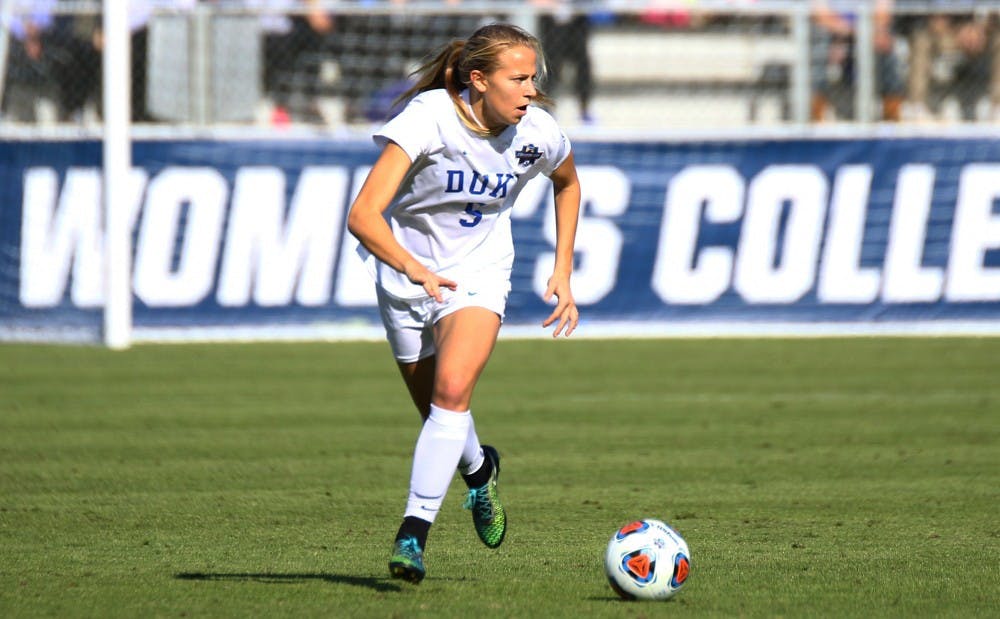In honor of Duke’s Centennial, the Blue Zone’s new Blast from the Past series highlights pivotal figures and events in Duke sports history. During this pride month, we look at a trailblazer for transgender athletes, at Duke and beyond:
Sports have famously been an arena with little representation for the LGBTQ+ community, but Duke alum Quinn is one of the premier representatives showcasing transgender and nonbinary excellence.
“Sports is a very interesting space to navigate, because it is divided in such a binary way between men and women,” Quinn said during an interview with Sportsnet. “For me, trying to understand the fluidity that [gender] is for me was such a stark contrast to what the sporting space was.”
The Toronto native has been a standout on the pitch since before their arrival in Durham, winning a silver medal at the 2012 CONCACAF Women’s U-17 Championship and starting four out of five matches for the team in the midfield. Additionally, Quinn competed at the international level in the FIFA 2012 U-17 Women’s World Cup and the 2014 FIFA U-20 Women’s World Cup.
Quinn revealed that at these events, they would have encouraged their younger self to “just to enjoy it.”
“There can be a lot of pressure at times,” they said. “But at the end of the day, get back to the love you have for being on the pitch.”
Unfortunately, Quinn wasn’t able to see as much time on the pitch at Duke as they may have liked. They arrived at Duke with high-level international experience, but their college career was pockmarked with injuries. Quinn’s healthiest standout seasons as a Blue Devil came in their junior and redshirt senior campaigns, when they earned a selection as United Soccer Coaches First Team All-American in the latter. In the same season, they were named Duke’s first ever ACC Midfielder of the year and a semifinalist for the MAC Hermann Trophy, which is awarded to the best collegiate men’s and women’s soccer players.
Quinn competed at the 2016 Summer Olympics with Team Canada while still at Duke, a rare feat for a college student. During the team’s first ever win against Germany, Quinn dished out an assist in a 2-1 victory.
Quinn returned to the Olympics in 2021 with Team Canada, this time carrying a new weight on their shoulders. Quinn had recently come out as transgender and nonbinary, changing their name to the mononymous Quinn. Though they faced the additional pressure of being the first out, transgender and nonbinary Olympian, they still blazed a trail of excellence. The former Duke star and their teammates earned a gold medal, the program’s first. Quinn also became the first openly transgender and nonbinary athlete to even win an Olympic medal.
Quinn revealed that they had decided to come out publicly after feeling misrepresented: “It was difficult for me when the announcers would say my deadname in front of sold out crowds.”
Since the 2021 Olympics, Quinn has continued to appear in contests with the Canadian national team and has scored several goals.
The future of transgender athletes in sports
Quinn mentioned that they felt rewarded by their presence in the community: “All the times that I hear fans on my social media, or when I’m playing and they’re in the stands, and they’re saying that they continued in sport because of my presence, I think that adds to my game and motivates me. It’s a very encouraging aspect.”
This effect can definitely be seen on their Instagram page, where they regularly receive comments about how they’ve inspired children to continue playing their sport.
The new generation of athletes has had role models that Quinn never had, and we will continue to see more transgender and nonbinary athletes in all aspects of the sporting world. Quinn envisions the future of gendered sports as an “ever-evolving landscape” and hopes to see a shift towards becoming more inclusive as the years go on.
In a consequential ruling for the transgender community of North Carolina, in 2023, the N.C. General Assembly ruled that trans girls and women cannot compete in women’s sports competitions. This legislation applies to Duke and supersedes the NCAA’s rules that do permit transgender athletes participating in the gendered division that coincides with their identity.
However, as Quinn said, the sports world is an ever-evolving landscape, and the future of transgender athletes at Duke may someday realign with their hopes for acceptance and inclusivity.
Get The Chronicle straight to your inbox
Sign up for our weekly newsletter. Cancel at any time.

